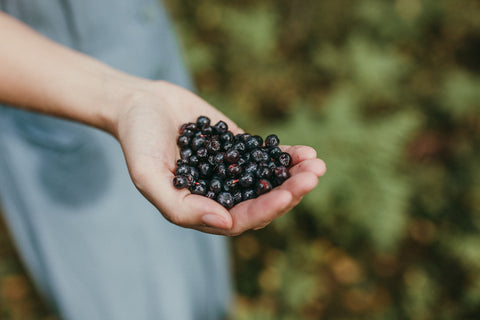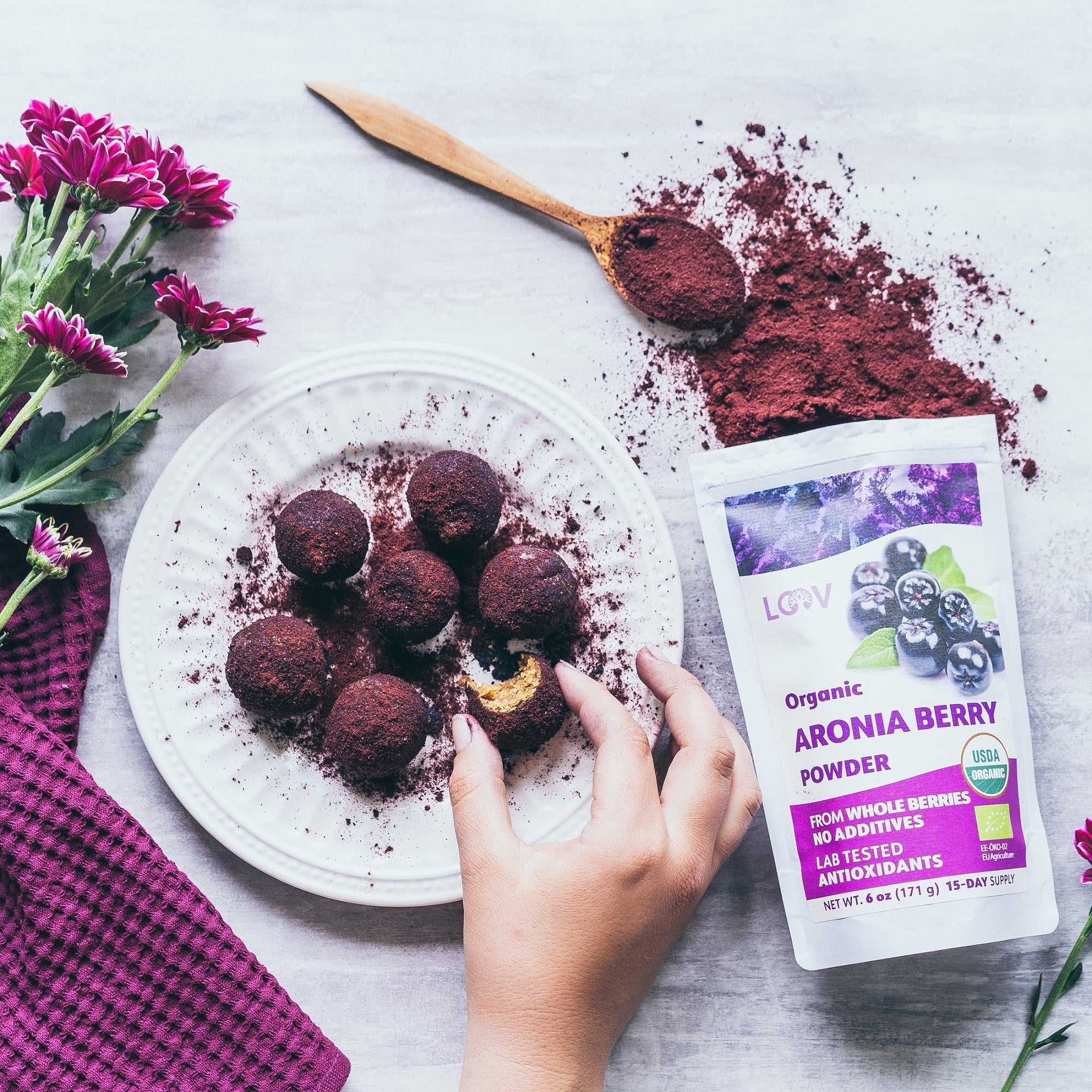You’re 70% more likely to fall sick during winter.
A team of scientists from Yale University discovered that lower temperatures weaken your first line of immune defenses.
Table of Contents
1. Wild Blueberries
2. Lingonberries
3. Raspberries
4. Aronia Berry
5. Get Fresh Berries Even When They Aren’t in Season
6. Kick the Winter Blues With Berry Superfoods
“We found that the innate immune response to certain pathogens is impaired at the lower body temperature compared to the core body temperature. The lower the temperature, it seems the lower the innate immune response to microbial threats.''
Akiko Iwasaki, Yale Professor of Immunobiology
It’s why winter and viral respiratory issues go hand in hand. It’s also why pre-existing medical conditions tend to get worse in the colder months.
The good news is that superfoods can strengthen your immune system and help fight off disease.
These are foods that are nutritionally dense and good for your health. Superfoods offer a variety of nutrients that can boost your immunity, especially during winter when you’re at a higher risk of falling ill.
At LOOV Food, we’ve discovered some of the best superfoods to exist in Nordic nature—berries.
Here’s why blueberries, lingonberries, raspberries, and Aronia berries should top your list of winter superfoods.
Wild Blueberries

According to the US Department of Agriculture (USDA), one cup of blueberries provides the following nutrients:
- Calories: 79.8 kcal
- Carbohydrates: 19.3 grams
- Fat: less than 1 gram
- Sugar: 9.85 grams
Blueberries are also a good source of vitamins and minerals, including:
- Vitamin C
- B-Complex Vitamins
- Vitamin E
- Vitamin D
- Calcium
- Iron
- Zinc
- Potassium
- Magnesium
Each of these nutrients is important. Vitamin C is particularly worth noting for the role it plays in combating colds and viral respiratory issues.
Vitamin C supports the immune system by enhancing the activity of white blood cells, which are responsible for defending the body against microbial issues. It can also help to reduce symptoms of allergies.
Blueberries have the highest antioxidant activity of commonly consumed fruits. They contain antioxidant compounds like anthocyanin pigments and quercetin flavonoids that can help fight against free radicals.
Free radicals are unstable molecules that steal electrons from other cells in the body. With the aid of antioxidants, your immune system can neutralise these free radicals before they cause conditions such as:
- Blood sugar management
- Heart conditions
- Malignant tumors
- Neurodegenerative diseases, including cognitive impairment and Parkinson’s
- High blood pressure
Antioxidants can also help prevent microbial issues from becoming worse when they do occur.
Blueberries contain many of the B-vitamins like riboflavin, thiamine, and niacin. Not only can these nutrients help protect your cells from free radical damage, but they also help support brain, heart, and eye health.
Virtually every process in the body requires B-complex vitamins. The nervous system, cardiovascular system, digestive, and immune system are among the many functions supported by these essential nutrients.
Because of their widespread role in the body, B-complex vitamins play a crucial part in maintaining health and wellness.
Nordic wild blueberries are richer in nutrients than cultivated berries. For example, the content of anthocyanins is twice as high in the wild berry than in the cultivated variety.
This table summarizes some critical differences between wild and cultivated blueberries:
Lingonberries
According to data from The Food Institute, one cup of lingonberries provides the following nutrients:
- Calories: 54 kcal
- Carbohydrates: 12.8 grams
- Fat: Less than 1 gram
- Sugar: 7.03 grams
Lingonberries are also a good source of vitamins and minerals, including:
- Vitamin C
- B-Complex Vitamins
- Vitamin A
- Vitamin E
- Sodium
- Calcium
- Iron
- Magnesium
These berries contain a high amount of vitamin C and antioxidants, which help to strengthen the immune system. This natural immunity booster can help prevent colds and viral respiratory issues while also boosting energy levels.
Lingonberries have strong microorganism-fighting activity as well, meaning that they can fight against microbial issues caused by bacteria, pathogens, and fungi. Studies have proven that the microorganism-fighting properties of lingonberries can even prevent bacteria formation in the mouth.
In addition, these berries have inflammation-fighting properties, which can help relieve symptoms of joint disorders and other inflammatory conditions. Consuming this fruit may reduce symptoms such as discomfort and swelling.
Raspberries
According to the USDA, one cup of raspberries provides the following nutrients:
- Calories: 64 kcal
- Carbohydrates: 14.6 grams
- Protein: 1.48 grams
- Fat: Less than 1 gram
- Sugar: 5.44 grams
Raspberries are also a good source of vitamins and minerals, including:
- Vitamin C
- B-Complex Vitamins
- Vitamin A
- Iron
- Calcium
- Magnesium
One cup of raspberries contains about 30 milligrams of vitamin C, which is roughly 60 percent of your daily needs. It makes them a great option to boost immunity during cold and respiratory concerns season.
Aronia Berry
The USDA provides nutritional information for Aronia berries in microdried and juice form. According to the database, a quarter-cup of these berries contains:
- Calories: 45 kcal
- Carbohydrates: 10 grams
- Fat: 3 grams
- Sugar: 3 grams
Aronia berries are also a good source of vitamins and minerals, including:
- B-Complex vitamins
- Vitamin C
- Vitamin E
- Folate
- Calcium
- Potassium
- Magnesium
- Zinc
Aronia berries, also known as chokeberries, are a hardy plant commonly found in the northern regions of North America and Europe. Traditional healers have used this berry as a folk remedy for centuries to treat multiple conditions, including lung ailments and joint disorders.
Modern science has discovered that these claims have merit as Aronia contains nutrients and phytochemicals with potent antioxidant, inflammation-fighting, and anti-neoplastic properties.
Aronia fruit is high in vitamin C (used to produce collagen), which is vital for wound healing. Aronia berries also contain ellagic acid, a compound found in many fruits and vegetables that has been shown to prevent DNA damage.
Aronia fruit has a high amount of L-arginine, an amino acid involved in protein synthesis and energy formation. It also acts as a potent vasodilator that widens blood vessels to improve blood flow.
Chokeberries have been used in folk medicine for centuries to treat joint disorders and inflammation of the respiratory tract.
A study published in the Journal of Medicinal Food found that when chokeberries were given to mice with induced colitis symptoms that mimic ulcerative colitis in humans, they experienced reduced inflammation.
These benefits may be due to essential compounds like polyphenols and anthocyanins (antioxidants). In another study, patients with joint disorders who took 20g/day of polyphenols from chokeberry juice over three months showed reduced discomfort and improved joint mobility.
Get Fresh Berries Even When They Aren’t in Season
LOOV Food uses one of the most effective preservation methods to ensure the berries get to you in their most nutritious and flavourful state.
Freeze-drying preserves about 97% of a food’s original nutritional value.
Here is how it works:
- We harvest berries at peak ripeness from organically certified Nordic forests.
- They undergo an in-depth cleaning process to ensure only the highest quality berries make it to the next stage.
- Flash freezing preserves all the berry nutrients.
- Freeze drying under a vacuum retains the original nutrition, shape, colour, and taste of the berries.
- Secondary drying at 48 degrees celsius gives the berries an extra-long shelf life.
- Sealing in moisture-free packaging keeps powdered berries from clumping and preserves their quality.
There are many benefits of choosing freeze-dried berries. To name a few:
- The nutritional value of freeze-dried berries is about 97%. Nutrients are not lost in the time it takes to ship them from Nordic countries.
- Freeze-dried berries retain the fruit’s original colour, taste, appearance, and texture.
- They have a longer shelf life.
- When placed in water, they are reconstituted, and resume their original state.
- They make great “on-the-go” snacks because they’re lightweight.
Freeze-drying is not the only preservation method. Dehydration is a cheaper alternative, and you might wonder why you shouldn’t go for berries preserved this way.
Unlike freeze-drying, dehydration doesn’t remove all the moisture from the food. Therefore, it offers a shorter shelf-life. More importantly, dehydration uses high temperatures that destroy nutrients in the food.
If you’re looking for winter berries that pack a punch, your best bet is LOOV Food’s freeze-dried range.
Here is what customers who’ve tried it have to say:
“As somebody who has had a lot of wild berries from Finland, I can tell you that these are the real deal. The thing that is great about these is that you can taste that they have been harvested at peak ripeness… before they had a chance to spoil…you definitely get your money’s worth.”
Cielo99, Verified Buyer
Kick the Winter Blues With Berry Superfoods
Did you know that all our organic freeze-dried berry powders are perfect for your winter comfort food recipes?
Here are just a few ways you can use our powders to give your dishes a berry boost:
- To top salads or be used in salad dressing
- As a yoghurt mix or topping
- Mixed into chia-seed pudding
- For making tasty truffles
- Sprinkled in homemade muesli and granola bars
- In cake or pancake batter
- For more flavourful desserts
- As sprinkles on frosting
If you’re looking for an easy way to add nutritious superfoods to your diet, look no further than our organic freeze-dried whole berries and powders. While at it, check out our berry recipe catalogue for delicious dishes that are easy to make.







